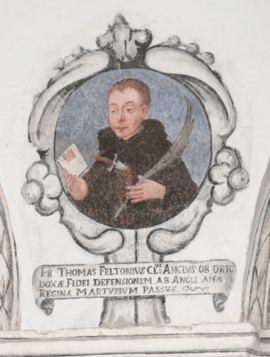Thomas Felton (martyr) facts for kids
Quick facts for kids BlessedThomas Felton O.M. |
|
|---|---|

Fresco of Blessed Thomas Felton by Greco Bernardino within a church in the Diocese of Conversano - Monopoli
|
|
| Martyr | |
| Born | c. 1566 or 1567 Bermondsey Abbey, Surrey, England |
| Died | 28 August 1588 (aged 20 - 22) between Brentford and Hounslow |
| Honored in | Roman Catholic Church |
| Beatified | 15 December 1929 by Pope Pius XI |
| Feast | 28 August |
| Attributes | knife in chest, holding a note, martyr's palm, Franciscan Minim habit, noose in neck, crown of martyrdom |
Thomas Felton (born around 1566 – died 1588) was a brave young man who lived in England. He was a Roman Catholic and a member of a religious group called the Minims. Thomas is remembered as a martyr, which means he died for his religious beliefs. His father, John Felton, was also a martyr.
Contents
Who Was Thomas Felton?
Thomas Felton was born in a place called Bermondsey Abbey in Surrey, England. This was around 1566 or 1567. When he was only about four years old, his father was executed. This happened because his father was also a Catholic and stood up for his faith during a time when Catholics faced difficulties in England.
His Early Life and Education
As a young boy, Thomas worked as a page for a lady named Lady Lovett. A page was like a personal assistant. Later, he went to study at the English College, Rheims, which was a school in France for English Catholics. In 1583, he took a step towards becoming a priest. This was when he received the "first tonsure," a special haircut that showed he was joining the church.
After his studies, Thomas joined the Minims, a religious order. The Minims lived a very strict and simple life. However, this way of life was too hard on Thomas's health. He became unwell and had to return to England. He went back to sort out his personal affairs before planning to return to France.
Facing Challenges and Imprisonment
Thomas tried to go back to France, but he was stopped on the coast of England. He was arrested and taken to London. There, he was put in a prison called the Poultry Compter. He stayed there for about two years.
His aunt, Mrs. Blount, helped him get out of prison. She had friends at the royal court who could speak up for him. Once free, Thomas tried again to go to France. But he was caught once more and sent to another prison, Bridewell prison.
After some time, he was released again. He made a third attempt to return to his school in Rheims. Sadly, he was arrested for a third time and sent back to Bridewell. This time, he was put in a very small, uncomfortable cell called "Little Ease." He was also treated very harshly.
His Final Trial and Legacy
Thomas was eventually brought to trial at Newgate. This happened shortly after the English navy defeated the Spanish Armada in 1588. The Spanish Armada was a large fleet of ships sent by Spain to invade England.
During his trial, Thomas was asked if he would have supported Queen Elizabeth if the Spanish had landed in England. He bravely replied that he would have supported "God and his country." However, he refused to agree that the Queen was the head of the Church of England. At that time, the Queen was considered the "Supreme Head of the Church of England." Because he would not agree to this, he was sentenced to death.
The very next day, on August 28, 1588, Thomas Felton was taken from Bridewell prison. He and another priest, James Claxton, were taken on horseback to a place between Brentford and Hounslow. There, they were both executed. Thomas Felton was only about 20 to 22 years old when he died. He is remembered for his strong faith and courage.
James Claxton
James Claxton was a priest from Yorkshire, a region in England. He also studied at the English College, which had moved to Rheims at that time. He became a priest in 1582.
James Claxton traveled to England to serve as a priest. He was captured and sent out of the country in 1585. However, he returned to England. He was arrested again and held in Marshalsea prison. On August 28, 1588, he was taken with Thomas Felton to a spot near Brentford and executed. On that day, eight people were executed in and around London for their religious beliefs.

